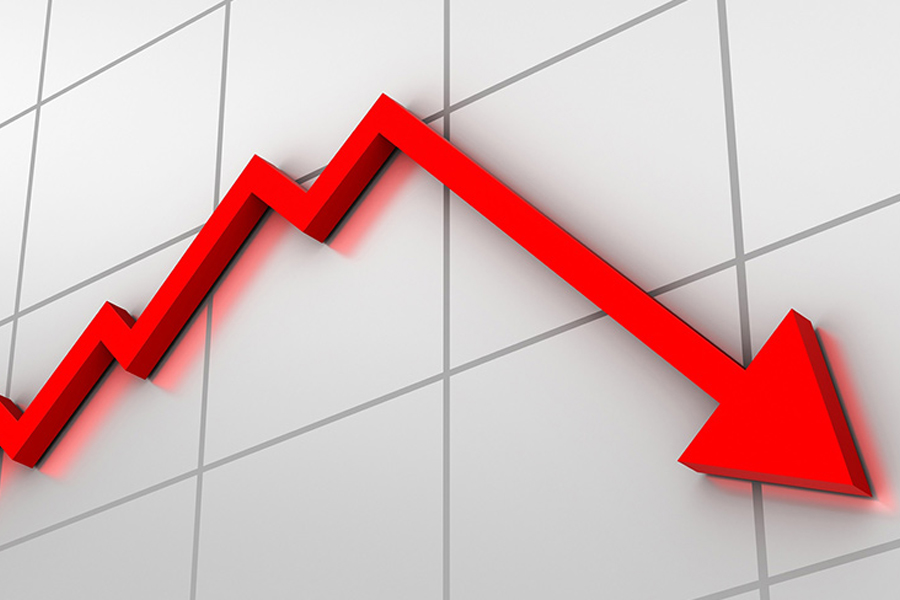Stocks back in red as policy rate hike weighs on investor sentiment
Turnover drops 10pc on prime bourse

Published :
Updated :

Stocks slipped into the red on Wednesday, snapping a two-day gaining streak, as investors' enthusiasm was dampened by the latest policy rate hike and ongoing turmoil over demand for the president's resignation.
Market operators noted that investor sentiment was impacted by potential interest rate hikes after the central bank raised the policy rate by 50 basis points to 10 per cent in a move to contain inflation.
This increase in the borrowing interest rate at which Bangladesh Bank lends to commercial banks is feared to drive up overall borrowing costs.
Higher interest rates have already made fixed-income instruments more attractive compared to stock market investments, while the potential for further rate hikes has exacerbated the market situation.
The relentless bearish spell the market has long been experiencing remained dominant throughout the session on Wednesday.
The benchmark index of the Dhaka Stock Exchange (DSE) ended the day almost 72 points or 1.37 per cent lower at 5,169, paring all the gains from the previous day. The index had gained 81 points in the past two days.
Five large-cap stocks -- BRAC Bank, Grameenphone, British American Tobacco, Olympic Industries, and Beacon Pharma -- jointly contributed over a 21-point fall in the index.
The blue-chip DS30 index, a group of 30 prominent companies, also lost 31 points to close at 1,892 while the DSES index, which represents Shariah-based companies, dropped 11 points to 1,162.
The depressed market returned to its losing streak due to selling pressure as risk-averse investors trimmed their equity exposure amid waning confidence, while the central bank's latest policy rate hike put further strain on the ailing market, commented EBL Securities.
The further policy rate hike may reduce the fund flow to the stock market for a short-term and the lending rate may go up initially, said a leading stockbroker.
Market-based rates, however, are necessary to reduce inflationary pressure and restore macroeconomic stability. "If the country's macroeconomic stability returns, the stock market will also be benefited in the long term," he said.
Trading activities remained stagnant at the yesterday's session, with the total market turnover dropping to Tk 3.22 billion, 10 per cent down from the previous day's turnover of Tk 3.58 billion.
The banking sector dominated the turnover chart, capturing 24 per cent of the day's total turnover, followed by pharmaceuticals (13 per cent) and food (11 per cent).
Major sectors showed negative performance. The non-bank financial institution saw the highest correction of 3.6 per cent, followed by telecom (2.6 per cent), food (2.16 per cent), engineering (1.92 per cent), power (1.36 per cent), pharma (0.9 per cent) and banking (0.5 per cent).
Losers outnumbered the gainers. Out of 399 issues traded, 306 closed in the red, 52 saw price appreciation while 41 issues remained unchanged on the DSE floor.
Lovello Ice-cream became the most-traded stocks, with shares worth Tk 180 million changing hands, closely followed by Agni Systems, Islami Bank, NRB Bank and Grameenphone.
IFAD Autos was the top gainer, rising almost 10 per cent, while ML Dyeing was the worst loser, enduring a 12 per cent correction, as it declared no dividend for FY'24.
The Chittagong Stock Exchange also ended lower, with its All Shares Price Index (CASPI) shedding 121 points to close at 14,502 and the Selective Categories Index (CSCX) losing 68 points to end at 8,830.
babulfexpress@gmail.com


 For all latest news, follow The Financial Express Google News channel.
For all latest news, follow The Financial Express Google News channel.